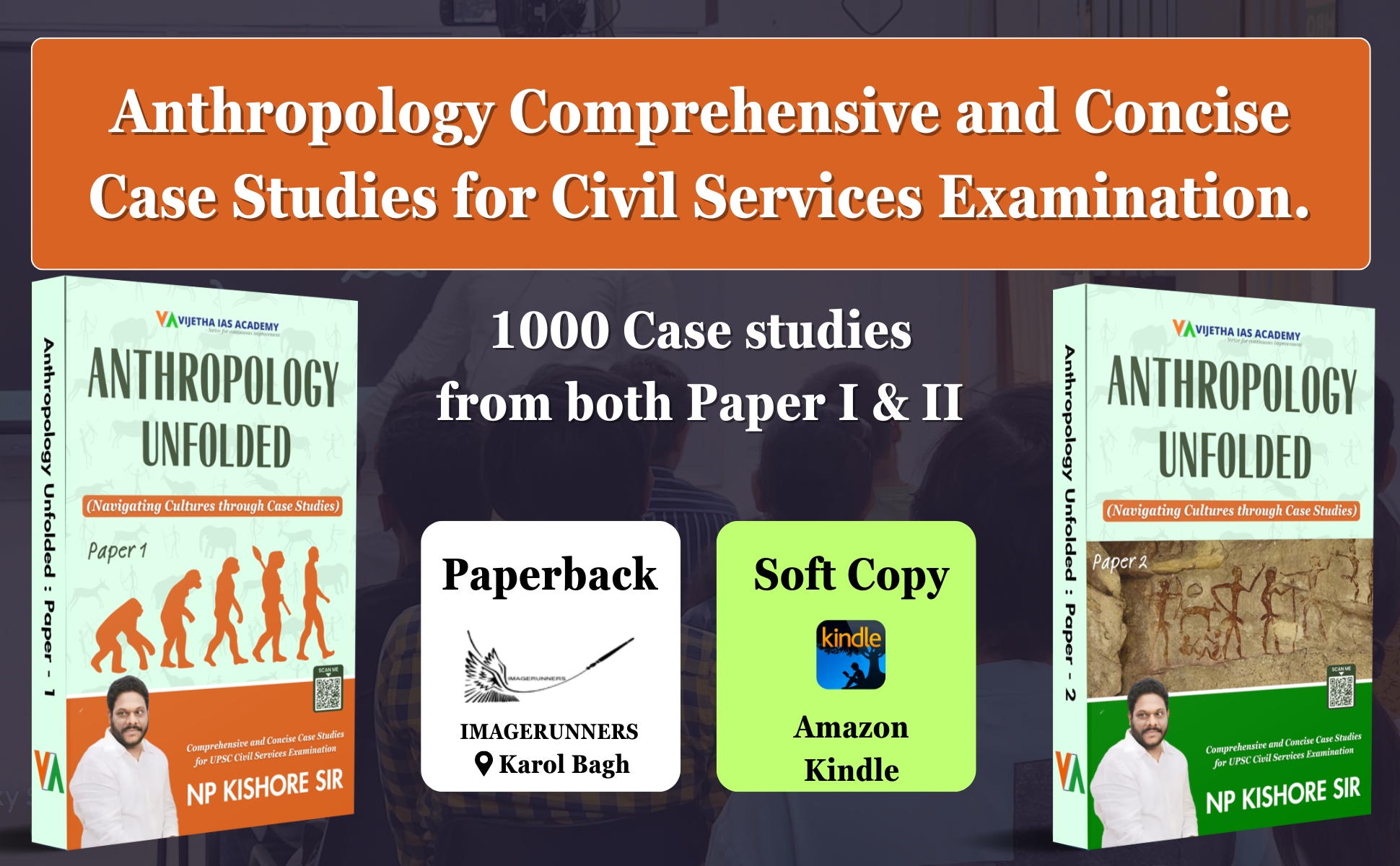
Anthropology Case Studies
Anthropology, as a field of study, is rich with insightful case studies that offer valuable perspectives on human societies, cultures, and behaviors. These Anthropology Case Studies not only contribute to our understanding of diverse cultures but also highlight the practical applications of anthropological theories.
In this blog post, we will delve into some of the most famous anthropology case studies, explore their significance, and discuss how Vijetha IAS Academy and Kishore Sir can guide you in mastering these concepts for UPSC preparation.
You Can get the book here: Best Anthropology Optional Case Studies Book for UPSC Paper 1
The Importance of Anthropology Case Studies
Case studies in anthropology provide detailed examinations of specific cultures, societies, or phenomena. They offer real-world examples of anthropological theories and methodologies, allowing students and researchers to:
- Understand Cultural Diversity: Gain insights into the customs, practices, and social structures of different communities.
- Apply Theoretical Concepts: See how anthropological theories are applied in real-life scenarios.
- Learn Research Methodologies: Understand the methods and techniques used in anthropological research.
- Address Contemporary Issues: Explore how anthropology can address and offer solutions to current social issues.
Famous Anthropology Case Studies
1. The Nacirema: A Study in Cultural Relativism
The Nacirema case study, written by Horace Miner, is a classic example of cultural relativism. Miner describes the rituals and daily practices of the Nacirema, a fictional tribe in North America, to highlight how cultural practices can seem strange or extreme when viewed from an outsider's perspective.
- Cultural Relativism: The study emphasizes the importance of understanding cultural practices within their own context rather than judging them based on one's cultural norms.
- Reflection: It serves as a reflection on American culture, using the lens of an "alien" perspective to highlight the sometimes unusual aspects of everyday life.
2. The Yanomami: Amazonian Life and Cultural Resilience
The Yanomami are indigenous people living in the Amazon rainforest. The research conducted by anthropologist Napoleon Chagnon offers a detailed look at their social organization, rituals, and conflicts.
- Social Structure: Chagnon’s work explores the Yanomami's social structure, including their kinship ties, political organization, and warfare.
- Cultural Impact: The case study provides insights into the impacts of external influences on indigenous cultures, including issues related to health and environmental changes.
3. The Kung San: Insights into Foraging Societies
The Kung San, also known as the Ju/'hoansi, are a foraging society in Southern Africa. Anthropologist Richard Lee's work with the !Kung San has been instrumental in understanding hunter-gatherer societies.
- Foraging Economy: Lee’s research highlights the !Kung San's subsistence strategies, social structure, and the significance of reciprocity in their economy.
- Cultural Preservation: The study offers insights into the ways in which traditional societies adapt and maintain their cultural practices in the face of external pressures.
4. The Trobriand Islanders: Magic, Science, and Religion
Bronislaw Malinowski's research on the Trobriand Islanders in Papua New Guinea is renowned for its in-depth exploration of their magical practices and social customs.
- Participant Observation: Malinowski’s method of participant observation provided a comprehensive understanding of Trobriand life, including their economic activities and rituals.
- Magic and Religion: The study examines the role of magic and religion in Trobriand society, revealing the complex interplay between social practices and belief systems.
5. The Maasai: Adaptation and Modernization
The Maasai people of East Africa are known for their distinctive culture and pastoral lifestyle. Anthropologists have studied their adaptation to modernity and the impact of socio-economic changes on their traditional way of life.
- Cultural Change: Research on the Maasai provides insights into how traditional societies adapt to modern pressures while striving to maintain their cultural identity.
- Socio-Economic Impact: The study highlights the challenges and opportunities faced by the Maasai in navigating contemporary economic and social changes.
How Vijetha IAS Academy and Kishore Sir Can Assist with Anthropology Case Studies
At Vijetha IAS Academy, we recognize the importance of understanding and analyzing famous anthropology case studies for UPSC preparation. Our expert faculty, led by Kishore Sir, offers comprehensive support to help you master these concepts. Here’s how we assist:
You Can get the book here: Best Anthropology Optional Case Studies Book for UPSC Paper 2
Kishore Sir’s Expertise
Kishore Sir brings a wealth of knowledge and experience to his teaching. His approach includes:
- Detailed Case Study Analysis: Kishore Sir provides in-depth explanations of famous anthropology case studies, breaking down complex concepts into manageable parts.
- Contextual Understanding: He emphasizes the significance of each case study in the broader context of anthropological theories and methodologies.
- Application of Theories: Kishore Sir helps students connect theoretical concepts with real-world examples from case studies.
- Critical Thinking: He encourages students to critically analyze case studies and explore their implications for contemporary issues.
Comprehensive Study Materials
Our study materials include:
- Case Study Summaries: Concise summaries of famous case studies to aid quick revision.
- Analytical Frameworks: Tools and frameworks for analyzing case studies and applying theoretical concepts.
- Model Answers: Sample answers for case study-related questions to guide effective writing and presentation.
Success Stories
Many students from Vijetha IAS Academy have excelled in their UPSC Anthropology papers, thanks to the detailed guidance and support provided by Kishore Sir. Our approach ensures that students are well-prepared to tackle complex case study questions and apply their knowledge effectively.
Conclusion
Famous anthropology case studies offer valuable insights into diverse cultures, social structures, and human behaviors. They are an essential part of UPSC preparation, helping students understand and apply anthropological theories in real-world contexts. With the expert guidance of Vijetha IAS Academy and Kishore Sir, you can master these case studies and enhance your preparation for the UPSC examination.
